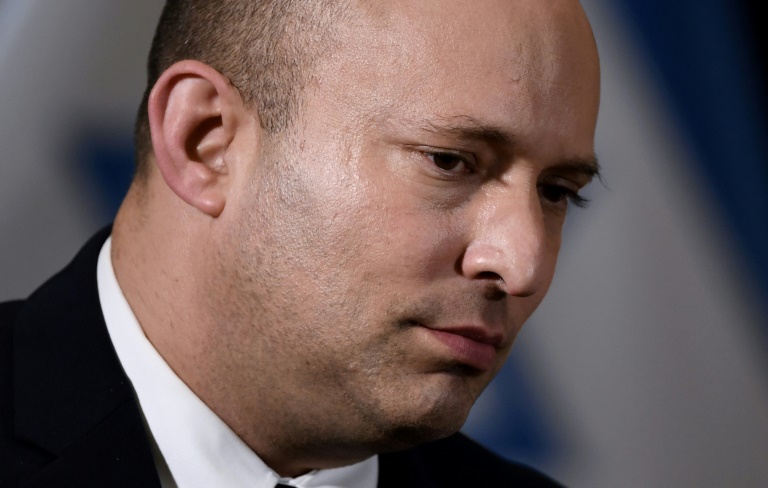Israeli Prime Minister Naftali Bennett meets President Joe Biden at the White House on Thursday to reboot ties with the Democratic administration despite deep differences on the Palestinians and Iran.
The 49-year-old leader took office in June as head of an ideologically divided coalition in which his hawkish party holds only a handful of seats.
“I bring from Israel a new spirit, a spirit of folks who sometimes harbor different opinions but work together in cooperation and good will,” Bennett said in a meeting with US Secretary of State Antony Blinken on Wednesday.
“This is the same spirit I want to bring to our relationship, of cooperation, of goodwill, of friendship.”
Dan Kurtzer, former US ambassador to Israel, told AFP Bennett’s visit would set a new tone after 12 years of Benjamin Netanyahu, a close ally of Biden’s tempestuous predecessor Donald Trump.
“Netanyahu believed that he knew better than the president with whom he was dealing, what the United States should do,” Kurtzer said.
By contrast, with Bennett, “even if there are differences on policy, which there will be, the two will be able to talk without this overlay of disrespect.”
On Wednesday Blinken’s office announced he had agreed with Bennett on “the importance of working toward Israel’s inclusion in the Visa Waiver Program” that would ease US entry for Israeli travelers.
Previous efforts failed in part because of unequal treatment of Arab-American travelers to Israel.
– Resuming nuclear deal ‘mistake’ –
Bennett said Iran would be the focus of his visit, primarily in “how do we fend off and curtail Iran’s pursuit to dominate the region and its race to a nuclear weapon.”
Israel fiercely opposes Biden’s attempt to reverse Trump’s withdrawal from a 2015 nuclear deal that lifted sanctions on Iran in exchange for curbs on its nuclear program.
Since Trump’s move, Iran has itself withdrawn from key commitments including on uranium enrichment.
On Wednesday, Israeli Defense Minister Benny Gantz told diplomats he was sure Iran had directly attacked an oil tanker managed by a company owned by an Israeli businessman in late July, killing two crew members.
Bennett has said he will present Biden with “an orderly plan” to restrain the Iranians, hinting Israel could leverage its new ties with Arab nations thanks to the US-brokered Abraham Accords.
US officials did not address the Iran deal directly Wednesday.
Blinken, however, told Bennett US commitment to Israel’s security is “unshakeable” and touched on “deep concerns we share about Iran” and its nuclear program.
– Two states ‘not relevant’ –
Advisors said Bennett had no plans to discuss resuming negotiations on a Palestinian state on territories Israel captured in 1967.
“Two states is not relevant, not existent,” a senior official told reporters.
Construction in the West Bank settlements, which the United States opposes, will continue, the aide said.
Biden’s administration supports a two-state solution and has restored hundreds of millions of dollars in aid to the Palestinians, much of which was cut by Trump, who described himself as the most “pro-Israel” president in history.
Blinken has also pledged to reopen a consulate in Jerusalem that managed relations with the Palestinians.
Trump closed the mission in 2019 and folded its portfolio into the US Embassy in Jerusalem, which he moved from Tel Aviv.
Bennett opposes resuming the mission as a recognition of Palestinian claims to east Jerusalem.
“We’re not pretending we agree on 100 percent of things,” the advisor said.
Friction between Israel and Gaza escalated during Bennett’s visit, including violent border clashes.
It was the most serious deterioration since Israel pounded Gaza with air strikes in response to thousands of rockets fired by militants in the territory in May.
Defense Secretary Lloyd Austin said the United States would “respond positively” to an Israeli request for $1 billion to replenish its Iron Dome missile defense system, adding that “we’re going to seek lasting security for Israelis and Palestinians alike.”
Shibley Telhami, a professor for peace and development at the University of Maryland, said the visit with Biden also lends Bennett legitimacy.
“The very fact that Biden is not likely to take a posture of public pushback on anything that Bennett is going to present publicly and in private would give the impression that he has Biden’s support,” Telhami told AFP.











